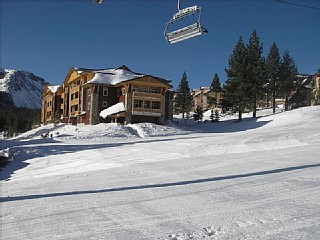We have all been there: We enjoy a great vacation in a beautiful destination, and are smitten by life there. We imagine what it might be like if a vacation home was ours, and start picking up local real estate brochures and searching online for sale listings. Pretty soon, conversations with a realtor could be occurring, and you begin you wonder if this dream is realty or pie in the sky. The idea of owning your own place in a ski town that your family loves just seems like the perfect next step.
Ski vacation homes are no different than the pattern we see with other vacation homes. They tend to be located in great ski towns that are fun in both summer and winter, have a charm that goes way above and beyond owning just a normal rental property, and they cater to people who are looking for both leisure as well as the active pursuit of a fun hobby.
When is it a good idea to buy a ski home, and when should you hold off? The answer is a little different for everyone, but we did our best to boil it down to five important things to consider. Here are five factors that would make a ski home a wiser decision for you. If you pass four or five of the criteria, you just might be a candidate for that great ski vacation home. Three or less, and be very careful.
You Are in a Financial Position of Strength
Being in a strong financial position means that you are not going to stretch your family’s finances in order to purchase your ski vacation home. You should have a down payment of at least 20% available (most vacation homes require at least 20% down, and many mortgage companies prefer even more). You ideally would not need to raid retirement funds or other investments that you otherwise would not be liquidating. On a monthly basis, the burden should fit with ease into your family’s budget, not be something that leaves you with no extra money for other vacations, key purchases, or your giving goals.
Buying a vacation home in a ski area should never be viewed as a sure thing in terms of investment. Real estate is doing well right now given the limited inventory, especially in ski areas, but don’t speculate your family’s future when it comes to buying a ski area home. It will still be there in a few years, and you never know what the market will do. Until then, there is absolutely nothing wrong with staying at the local Marriott or a vacation rental, and letting someone else worry about property upkeep and mortgage payments.
Any Rental Income from the Unit Can be a “Nice to Have”
Similar to the first point, we think it is important to be financial conservative when planning for rental income from the unit. Many houses and condos in ski areas rent out quite well in the winter months, but those are the exact months when you may want to ski. They generally do not make as much income in the summer months, but in many areas can provide enough income to be relevant. The spring “mud season” market is generally very low, and you should expect to see several days with no occupancy. Finally, fall tends to be hit-and-miss, as people know that at times like late October you may get beautiful Aspen leaves, or a cold rain storm.

Keep in mind, as well, that if you rent through a major booking center such asthe central reservation operation of the nearby ski resort, you will likely pay a property management fee of 40-50% of rental receipts. You can get by with VRBO or AirBnB for a lower fee, but you will need to be prepared to be much more involved in each rental.
Also, note that during winters with poor snow, the rental income can be much lower. We have seen ski-season rental income decrease by 30% or more when a ski resort is having a well-publicized bad snow season. COVID also did a number on ski towns and rentals, because the number of lift tickets sold was rationed. Who wants to do a ski trip if you aren’t sure you can even get lift tickets?
The bottom line is that rental income is a nice thing to have, but should not be required for you to buy the place. If you would not be sweating it if there was no rental income for a couple straight months, then consider that a good sign!
Time is On Your Side
Prices on ski vacation homes can fluctuate significantly, as vacation homes are well-known for appreciating and declining in an exaggerated fashion compared to primary homes. The 2008 recession was especially painful for vacation home renters (and appealing for vacation home buyers). What makes this phenomenon worse is that inventory in ski towns often goes in fits and spurts. Attracting builders to town can be challenging given the remote locations and expensive cost of living. When builders arrive, though, they can often expand the housing stock pretty quickly, compared to what was there before. It is good to know exactly where your target ski area might be in that cycle.
The broader point is that because of the exaggerated nature of value increases and decreases, it is important to know that your investment might not be as liquid as ideal. If your time horizon for owning is 10 years to indefinite, then you might have the right mentality for the vacation home. If you need the home to hold its value or appreciate, and then sell it when the kids go to college, you might be left holding the bag.
There is a Strong Chance that it will be your Retirement Home
If you are buying the vacation home for your retirement – and we are talking about heavy use in retirement, then it might be worthwhile to explore. Notwithstanding market ups-and-downs, the long-term real estate market in the US averages appreciation of around 4-5% per year, so purchasing your future home today could we wise. Of course, that appreciation can easily be zeroed out by interest payments, cost-of-ownership, and maintenance if you do not buy carefully.
If you were to buy a ski condo for say, $500,000, and the condo appreciated by 4% each year for 10 years, that same condo might cost nearly $750,000 to buy at that time. Only you can decide if you could make better returns with that $500,000 in other ways over the same decade, but if you are relatively certain that you might end up in a ski town someday, buying soon could make sense as long as you are not buying into a bubble. Of course, buying in a dip is highly desirable, but the problem is that you only really know that it was just a dip in retrospect.
Note that there is nothing wrong with simply renting a ski place for a couple weeks a year in retirement. If you are going to plunk down a big chunk of change to buy a ski home, you will want to be sure it is a place you could frequent in years to come.
You Expect to Spend More Than 60 Days Per Year There
In the end, having a vacation home is all about enjoyment, experiences, and creating memories. If you would legitimately use a vacation home significantly, say 60 days a year or more, then you might be a good candidate for buying assuming some of the other criteria also check out. The 60 day figure is a bit arbitrary, but in our minds it is roughly the point where it might make sense to have an additional financial burden hitting your family budget each month. Around 60 days is also the neighborhood where the cost of renting a hotel or other lodging becomes prohibitive compared to the cost of a monthly mortgage.
Now, our 60 day rule of thumb is a little different than the IRS rules on vacation rentals, so please do not consider this tax advice. However, we think that the IRS rules feel like the tail wagging the dog. Use the place as you see fit, and figure out the tax situation later.
We are not saying that if you won’t use a place for 60 days, you shouldn’t buy it. Especially if the rental income is likely, you could still make a go of it if you were not using it as regularly. But frequent use of a vacation home will help justify the expense more than almost any other factor. Just be sure you are realistic about how much you will use it, knowing things like your childrens’ busy schedules, the cost to get to the particular ski destination, and your appetite for spending the money that comes along with each trip (food, lift tickets, etc.)

Paul Miller is the Founder of Family Skier. He is an advanced skier and has extensive experience with family travel and ski schools. An accomplished skier, he has skied in 15 states and provinces and 6 countries. In addition to FamilySkier, his writing can be found on many ski-related websites, and as curriculum for many ski clubs in North America.




